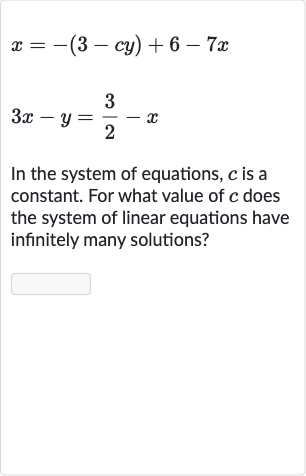AI tutor
Welcome to Bytelearn!
Let’s check out your problem:

In the system of equations, is a constant. For what value of does the system of linear equations have infinitely many solutions?
Full solution
Q. In the system of equations, is a constant. For what value of does the system of linear equations have infinitely many solutions?
- Simplify first equation: Let's first simplify the first equation:Combine like terms and move all terms to one side:Now, divide by to solve for :
- Simplify second equation: Now let's simplify the second equation:Move the x term to the left side to combine with the term:Now, divide by to solve for :
- Set equations equal to each other: For the system to have infinitely many solutions, the two expressions we found for must be identical. Therefore, we set them equal to each other:To solve for , we need to get rid of the denominators by finding a common denominator and multiplying both sides by it. The common denominator for and is , so we multiply both sides by :This simplifies to:
- Solve for c: Now, we need to solve for c. First, let's move all terms involving to one side and constants to the other: Combine like terms: Now, divide by to solve for : Multiply by to solve for :
- Reconsidering the mistake: However, we made a mistake in our reasoning. For the system to have infinitely many solutions, the equations must be dependent, which means they must be multiples of each other. The mistake was in assuming we could solve for a specific value of without considering the relationship between the coefficients of the two equations. We need to go back and compare the coefficients of and in both equations to find the condition for .
More problems from Solve rational equations
QuestionGet tutor help
